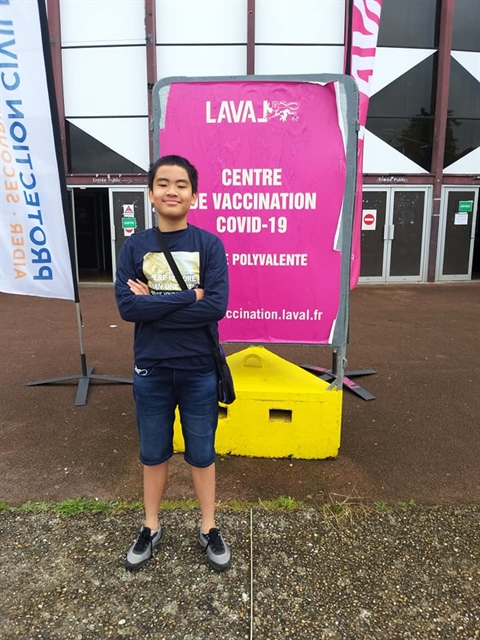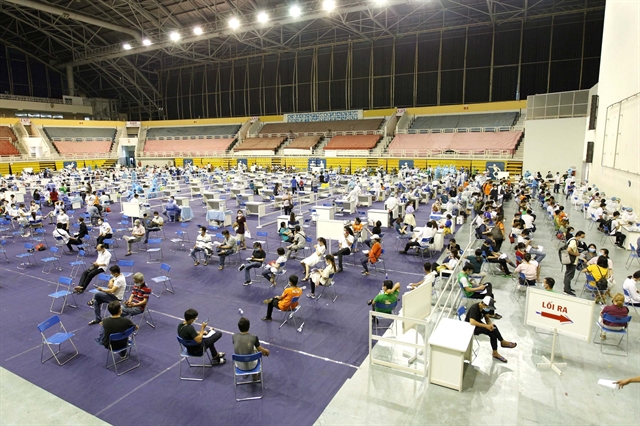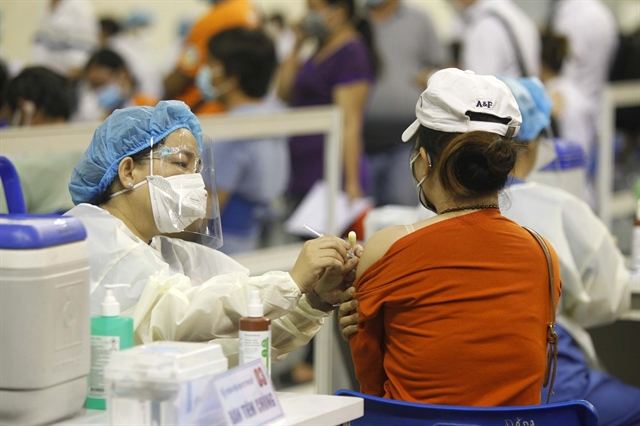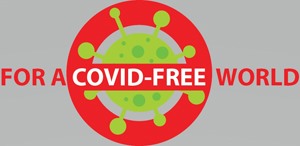 Society
Society

Việt Nam is one front runner in mobilising social capital from individuals and private sector through the establishment of the COVID-19 Vaccine Fund.
Vân Nguyễn
As the vaccination rate is picking up, people in France’s western town of Laval, where Trần Thị Phương Thảo lives, are entering a new phase in the pandemic with a renewed sense of hope.
Thảo, who has lived in France for more than 10 years and considers this country her second home, is excited to see normal life gradually return.
“We are excited to have the first trip abroad since COVID-19 and see services reopen,” she said, adding that almost all services have resumed and curfews lifted.
Four adults and a teenager in her family of six have received at least one dose of vaccine against COVID-19.
Her two children, who are in elementary and secondary school ages, are counting down the days before a family trip to Germany and her parents have just returned to France from a vacation in Portugal.

|
| The 14-year-old son of Thảo received his first dose of the COVID-19 vaccine. In France, people are no longer required to wear masks outdoors. — Photo courtesy of Trần Thị Phương Thảo |
Nguyễn Thu Hà, a Vietnamese post-graduate student in Emilia-romagna, Italy also sees life more open as vaccination is pushed back.
She is finalising her insurance paperwork to prepare for the vaccination and will travel to Germany to visit her relative after being inoculated.
“There are still infections in my area but almost all services started to reopen in late May. There are restaurants and cafés, bars are all open,” said Hà.
Unlike Hà and Thảo who live in countries with an abundant supply of vaccines, environmental worker Nguyễn Thị Ngoan in Hà Nội doesn’t know exactly when she will get the first jab.
“Working in the streets and having contact with many people every day puts us at a high risk of infection. We do have concerns about the transmission and are waiting to be vaccinated,” she said, adding that workers like her are provided with face masks, gloves and sanitisers.
Việt Nam is grappling with the fourth wave of COVID-19 infections which started in late April with over 12,000 new cases since then. The pandemic has infected nearly 50 provinces and cities in this wave, according to the statistics from the Ministry of Health.
Considering vaccinations as a fundamental measure in COVID-19 prevention and control, the country is pushing the vaccination roll-out which has been hampered by limited supply.

|
| More than 9,000 workers, officers, students and local residents in HCMC are vaccinated on May 24 at Phú Thọ Stadium. — VNA/VNS Photo Thanh Vũ |
As of Monday, Việt Nam has administered nearly 3.5 million doses of COVID-19 vaccines, with the number of people fully inoculated reaching 173,000, according to the health ministry. These account for about 3.5 per cent and 0.2 per cent of total population respectively.
The New York Times’s Covid World Vaccination Tracker showed that the rates of fully vaccinated people in the United Kingdom, the United States, Italy and France are 48 per cent, 46 per cent, 29 per cent and 28 per cent respectively as of Monday.
According to the World Health Organization in Việt Nam, more than 75 per cent of all vaccines have been administered in just 10 countries.
“Although significant progress has been made in global collaboration, there still remains a shocking inequity in the global distribution of vaccines,” WHO Representative in Việt Nam Dr Kidong Park told Việt Nam News.
“As the vaccines are new and the COVID-19 vaccination is an unprecedented mass campaign, it is a challenging task for any government. The Vietnamese Government is mobilising mechanisms to procure more vaccines for Vietnamese people.
“It is also supporting development of COVID-19 vaccine domestically, which is encouraging and quite impressive.”
Though the country did a great job in curbing the pandemic in the last three waves of infections, it sees vaccinations as an effective tool and weapon to prevent and combat infectious diseases like COVID-19 and has been seeking ways to access all vaccine sources in the world.
Speaking at a recent government meeting Deputy Prime Minister Vũ Đức Đam said since late 2019, the National Steering Committee on COVID-19 Prevention and Control was determined that the then SARS-CoV-2 would persist for a long time and only when vaccines or treatment drugs are made available, could the pandemic be controlled.

|
| A woman in HCMC, now an epicentre of the pandemic, is inoculated against COVID-19. — VNA/VNS Photo Thanh Vũ |
“Việt Nam has made a determination to have vaccines as soon as possible,” he said.
Since early 2020, the Ministry of Health has been tasked to work with all potential vaccine manufacturing companies in the world to negotiate, buy and import vaccines or receive technology transfer, he added.
Since August 2020, the Ministry of Health has signed a contract to buy vaccines from Astra Zeneca company. At the same time, the Ministry of Science and Technology together with the Ministry of Health were assigned to research and develop locally-made vaccines.
Among the locally-made vaccines, Nano Covax has been in the third phase of human trials with more than 13,000 volunteers joining. The trial is expected to be completed in August, paving the way for vaccine authorisation.
Việt Nam affirmed in early June that it would secure a total of 170 million doses of COVID-19 vaccines.
The country also has a plan to purchase copyrights and receive technology transfer for COVID-19 vaccine production as well as co-operate with vaccine manufacturers around the world.
The WHO representative said Government’s efforts in financing vaccines, exploring supplies and supporting local manufacturing capacity are “very encouraging initiatives”.
Park said: “Việt Nam is one front runner in mobilising social capital from individuals and private sector through the establishment of the COVID-19 Vaccine Fund. These efforts are innovative to ensure sufficient vaccines are available to priority groups.”
The national COVID-19 vaccine fund, which debuted on June 6, has received nearly VNĐ8 trillion (US$347.8 million) as of June 29.
He noted that vaccinations was just one of the tools to contain the pandemic.
“Good surveillance systems, aggressive contact tracing, large-scale testing, risk-based public health measures and consistent communication to the public are critical," he said.
"The Government is using all these tools to manage the surge of cases in the country.”
Though living thousands of miles from her home country, Thảo has closely followed the situation.
“Despite the complicated developments of the new wave of infection, I feel hopeful to see that the government is doing their best to bring in more vaccines and people are willing to be vaccinated,” said Thảo. VNS

|